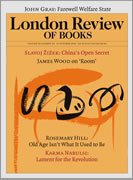Farewell Welfare State
Though few anticipated the agreement, it is not difficult to understand why David Cameron and Nick Clegg should have made a bargain to share power. By forming a coalition Cameron secured protection from his mutinous right wing, while Clegg became the pivotal player in British politics. What is more surprising is the degree of unity the government has so far exhibited. In Britain we think of coalition government as non-ideological, formed from necessity and living by compromise. When the coalition came to power there were many who welcomed it as a refreshing departure from tribal politics. Others feared that a government made up of parties with such different histories and cultures would lack clear direction – decisions would be fudged, policies too cautious. More
China’s Open Secret
Khrushchev’s speech in 1956 denouncing Stalin’s crimes was a political act from which, as his biographer William Taubman put it, ‘the Soviet regime never fully recovered, and neither did he.’ Although it was plainly opportunistic, there was just as plainly more to it than that, a kind of reckless excess that cannot be accounted for in terms of political strategy. The speech so undermined the dogma of infallible leadership that the entire nomenklatura sank into temporary paralysis. A dozen or so delegates collapsed during the speech, and had to be carried out and given medical help; one of them, Boleslaw Bierut, the hardline general secretary of the Polish Communist Party, died of a heart attack. The model Stalinist writer Alexander Fadeyev actually shot himself a few days later. More
Lament for the Revolution
Nowadays, when Palestinian activists in their twenties and thirties meet up with veterans of the Palestinian struggle, they show an unexpected thoughtfulness towards the older, revolutionary generation, to which I belong. This is nothing like the courtesy extended as a matter of course to older people in our part of the world: it is more intimate and more poignant. What brings us together is always the need to discuss the options before us, and to see if a plan can be made. Everyone argues, laughs, shouts and tells black jokes. But whenever a proper discussion begins, the suddenly lowered voices of our frustrated young people, many of them at the heart of the fierce protests on university campuses and in rights campaigns elsewhere, have the same tone I used to hear in the voices of our young ambulance workers in Lebanon in the 1970s and 1980s: an elegiac gentleness towards the hopelessly wounded, towards those who were already beyond repair. More




